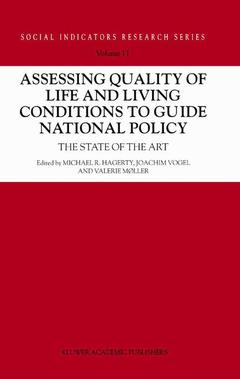Description
Assessing Quality of Life and Living Conditions to Guide National Policy, Softcover reprint of the original 1st ed. 2002
The State of the Art
Social Indicators Research Series, Vol. 11
Coordinators: Hagerty Michael R., Vogel Joachim, Møller Valerie
Language: English
Subjects for Assessing Quality of Life and Living Conditions to Guide...:
Publication date: 12-2010
450 p. · 15.5x23.5 cm · Paperback
Publication date: 07-2002
450 p. · 15.5x23.5 cm · Paperback
Description
/li>Contents
/li>
Our book is a useful "how to" book for researchers and government offices wanting to start or improve their own QOL survey, and contains "best practices" from all over the world. We discuss cutting-edge surveys that are being adopted by all countries in the European community as a standardized measure of each country's progress. We also discuss how developing countries can begin the measurement of Quality of Life in ways that will increase political credibility and require smaller budgets. Other chapters describe policy applications of the Quality of Life surveys, including nations' health goals, smoking cessation, child welfare, and poverty reduction.
The authors of these chapters are the world's top experts on assessing Quality of Life. For example, the author of the first chapter is Sten Johansson, former Director of Statistics Sweden, responsible for creating the first comprehensive QOL assessment systems in the world, beginning in the 1960's. The author of the second chapter is Professor Ruut Veenhoven, known as the premier researcher on national happiness, having developed the largest database in the world on the subjective measures of well-being. Heinz-Herbert Noll is responsible for developing the unified Quality of Life measurement system for the new European Union, where up to 25 countries will be assessed using the same methodology and questionnaires.




